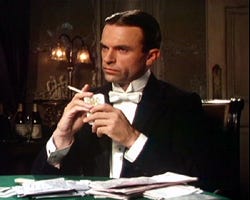“Reilly is not motivated by money. Reilly is interested in money.”
I first watched this when it came out, in 1983. Later I bought the DVD set, watched it again, maybe twice. Now the DVDs are with an ex-girlfriend but everything streams so that doesn’t matter. It’s streaming again and I just finished the series (12 episodes) again. Needless to say, I find it completely absorbing. The opening theme, from Dimitri Shostakovich’s “Gadfly Suite,” is an earworm. I kinda have to write about it.
The title figure, not exactly a protagonist, was a famous British spy playing a consequential role against the background of the spectacular events of the first thirty years of the 20th Century: the Russo-Japanese War, World War I, the Bolshevik revolution, and the rise of Josef Stalin to dictatorship of the Soviet Union. The spy in question is Jewish, lives in luxury most of the time, outsmarts everyone he comes up against, and seduces any woman he chooses. What’s not to like? He is also a ruthless, dedicated counter-revolutionary, as far as Bolshevism is concerned. One gets a hint of leftish inclinations, as he doesn’t blanch at the execution of the Czar’s family. He’s also a bounder and a cad, as the British probably said of him, with respect to women. After suffering through a viewing of the series, or part of it, my wife hated him.
The story was first told by Bruce Lockhart (Sir Robert Hamilton Bruce Lockhart, if you want to get formal), another British agent in the revolutionary Soviet Union. The TV series follows the story told by Lockhart, but they’re all professional liars in the espionage business, so who knows what really happened.
One tantalizing, lingering question raised by the story is the origin of the plot to assassinate Lenin. The Soviets blamed it on the British, and of course they would. In the TV version, there is a faint suggestion that it was the doing of the head of the Cheka (the Soviet secret police), Felix Dzerzhinsky. In the latter hypothesis, the object was to justify wholesale repression of numerous counter-revolutionaries running amuck at that time and safeguard the revolution. I have my doubts on the latter count, but the idea of Lenin’s personal security being so lax in that era as to allow an amateur to shoot him is also hard to believe.
The acting is fabulous. I’d forgotten how good Sam Neill, who plays Reilly, looked in his youth. In fact, he looks much better than the photographs of Reilly. Also striking is the character of Dzerzhinsky, played by Tom Bell. Dzerzhinsky is just as ruthless as Reilly, and just as cool. What that says about me, I leave to you gentle readers.
Reilly survives several brushes with death, but on the whole the action in the story hangs together and requires little suspension of disbelief, in contrast to most spy movies, especially American ones.
I really relish a good spy flick or novel. The movie and TV versions of the le Carré novels are all great, especially the original “Tinker Tailor” series with Alec Guinness. There are no stupid car chases or gun battles where the bullet-proof protagonist has unerring aim. American spy movies or TV productions tend to be idiotic. (Exceptions on the latter side include The Good Shepherd and Breach.) I do like the Bond movies as simple brainless fun where the actors playing villains go over the top and the Bond girls all get naked. What’s not to like.
The Brits are much better at espionage and police shows. The acting is better and the stories make more sense. But there are so many British police dramas that the market has gotten saturated. It’s harder to find the good ones.



Not too long ago, I read Benny Morris's book "Sidney Reilly: Master Spy," the only work of this important historian that I've read. Like you, I watched the miniseries when it appeared on PBS and then twice years later, on a streaming service: before and after reading the book.
I found the TV series mesmerizing the first time. Morris's book isn't as compelling as the series and Reilly isn't as fun a character as Sam Neill makes him appear. But life is so much more real than TV! -- for better or worse.